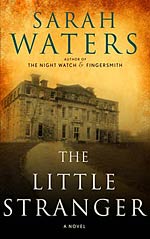
![]() booksbrainsbeer
booksbrainsbeer
1/22/2014
![]()
What is the purpose of the modern ghost story? Is it to terrify the reader? It mustn't be; modern horror is populated by zombies, if the supernatural is present at all, or otherwise awash in gore; ghosts by their very nature are incapable of eviscerating the living souls they haunt, or of unloosing an apocalypse upon the world. Ghost stories are quieter, more subtle; they trade not in horror, but in discomfort and unease. Ghost stories creep, incrementally, from the impossible to the implausible to reluctant belief in that which must not be--but is. The purpose of the ghost story, then, is the revelation of uncomfortable truths--those we wouldn't otherwise face--by the means described above. Thus it is in The Little Stranger, a grand ghost story in which Susan Waters admirably captures the claustrophobia and creeping dread of the modern supernatural tale, as well as the starkness and want of postwar England.
The story is narrated by Dr. Faraday, a country doctor in Warwickshire, England, who relates his growing involvement with the local gentry, the Ayres family, and their ancestral home, Hundreds Hall. Faraday begins his tale appropriately enough, in the interwar war years, just after the close of World War I. The doctor recalls a celebration hosted by the Ayres' for which the entire countryside turned out. During the festivities, he slipped into the hall to admire it and, taken with the place, pried a sculpted acorn from a wall: The first of many visits to the hall, though nearly 30 years would pass before he again set foot in the house. When Faraday does return, it is by accident--his partner, the Ayres' usual physician, is unavailable--and set against the dreary backdrop of postwar England--of bleakness and rationing--which seem to be reflected in the steadily declining fortunes of the Ayres family and the much-transformed (and increasingly decrepit) Hundreds Hall. Thus begins Faraday's tragic involvement with the Ayres and with Hundreds itself.
It's from this humble acorn that a mighty oak doth grow. (Pardon the pun.) Waters cleverly settles upon first person narration, resulting in a subjective perspective of the story; the reader can never be sure what is real and what isn't. Likewise, Faraday is a doctor, a professional man of science and an authority figure whose opinions carry weight, a fact of no little significance in a supernatural tale. After all, whom would you believe: Roderick Ayres, the stressed family scion and shell-shocked World War II vet, or the steady if bland Dr. Faraday? The choice is clear--most of the time, anyway.
Waters beautifully captures postwar England. Faraday's voice is spot-on; if it's not the voice of a postwar middle-aged Englishman, it's what we in the twenty-first century imagine that voice to have been. (American readers, such as myself, will be much taken with what we perceive as quaint twentieth century Anglicisms.) But Waters' strength is not limited only to Faraday's voice. Waters can paint a scene, and invites the reader into the English countryside, the cheerful little homes in the village and, especially, the sprawling, decaying manse of Hundreds Hall. She is a keen observer of human nature, and the main characters are all well-drawn, though Faraday, of course, is the most complex of all.
The Little Stranger is not just a ghost story but also a commentary on the British class system. Faraday, a doctor born of a laboring family, tends to the Ayres, fading gentry, and the place they call home. The mysteries of the book involve not only the ghosts that may or may not roam Hundred's halls, but also those that haunt postwar Britain. The reader might not be entirely surprised by the ways in which the story turns out, but he or she will be unsettled--and isn't that point? And all accomplished with nary a zombie to be seen.
http://www.librarything.com/work/7609965/summary/77174326